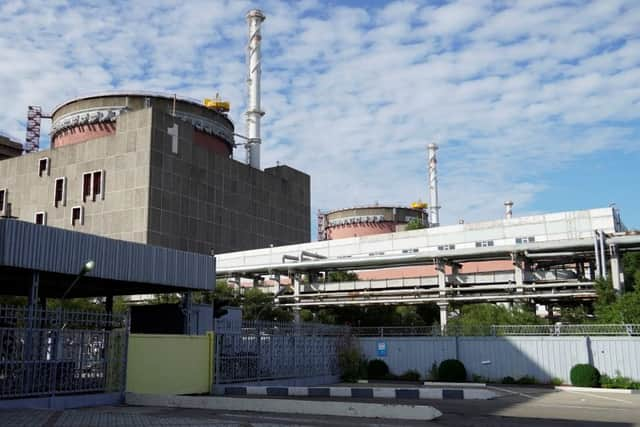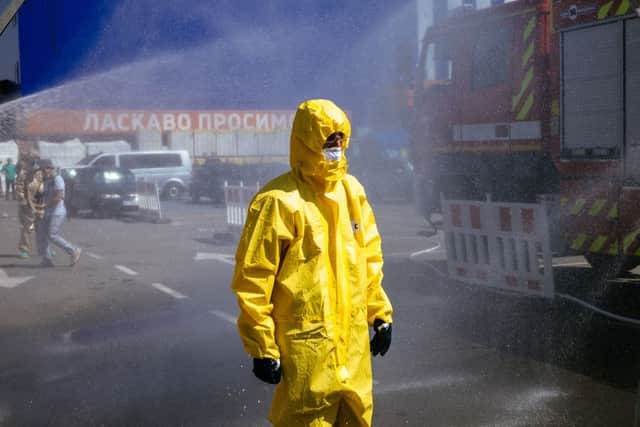Ukraine’s Zaporizhzhia nuclear plant surrounded by Russian troops loses all external power for safety systems
and live on Freeview channel 276
A Ukrainian nuclear power plant surrounded by Russian troops has lost all external power needed for vital safety systems for the second time in five days, a UN nuclear watchdog has warned.
International Atomic Energy Agency (IAEA) director-general Rafael Grossi said agency monitors at the Zaporizhzhia nuclear power plant reported the interruption, adding that back-up diesel generators are keeping nuclear safety and security equipment operational.
Advertisement
Hide AdAdvertisement
Hide AdIn a tweet, Mr Grossi wrote: “This repeated loss of #ZNPP’s off-site power is a deeply worrying development and it underlines the urgent need for a nuclear safety & security protection zone around the site.”
It comes as Ukrainian forces have recaptured five settlements in the southern Kherson region, military officials have said.
The villages of Novovasylivka, Novohryhorivka, Nova Kamianka, Tryfonivka and Chervone in the Beryslav district were retaken as of 11 October, according to southern Operational Command spokesman Vladislav Nazarov. The settlements are in one of the four regions recently annexed by Russia.


Meanwhile, Russia’s top domestic security agency said it has arrested eight people on charges of involvement in the bombing of the main bridge linking Russia to Crimea, while an official in the southern Ukrainian city of Zaporizhzhia said Russian forces carried out more strikes there.
Advertisement
Hide AdAdvertisement
Hide AdThe Federal Security Service, known by the Russian acronym FSB, said it arrested five Russians and three citizens of Ukraine and Armenia over Saturday’s attack that damaged the Kerch Bridge between Russia and the Crimean Peninsula.
The Kerch Bridge is important to Russia strategically, as a military supply line to its forces in Ukraine, and symbolically, as an emblem of its claims on Crimea.
A truck loaded with explosives blew up while driving across the bridge, killing four people and causing two sections to collapse. Ukrainian officials have lauded the explosion on the bridge, but stopped short of directly claiming responsibility for it.
The FSB alleged that the suspects were working on the orders of Ukraine’s military intelligence to secretly move the explosives into Russia and forge the accompanying documents.


Advertisement
Hide AdAdvertisement
Hide AdIt said the explosives were moved by sea from the Ukrainian port of Odesa to Bulgaria before being shipped to Georgia, driven to Armenia and then back to Georgia before being transported to Russia in a complex scheme to secretly deliver them to the target.
Mr Putin alleged that Ukrainian special services masterminded the blast, calling it “an act of terrorism”, and responded by ordering a barrage of missile strikes on Ukraine.
Russia’s onslaught continued in the Zaporizhzhia region and eponymous city on Wednesday, shattering windows and blowing out doors in residential buildings, municipal council secretary Anatoliy Kurtev said. There were no immediate reports of casualties, though Mr Kurtev warned locals of the possibility of a follow-up attack.
Zaporizhzhia has been repeatedly struck with often deadly attacks in recent weeks. It is part of a larger region, including the nuclear power plant now in Russian control, that Moscow has said it has annexed in violation of international law. The city itself remains in Ukrainian hands.
Advertisement
Hide AdAdvertisement
Hide AdThe new clashes came two days after Russian forces began pummelling many parts of Ukraine with more missiles and munition-carrying drones, killing at least 19 people on Monday alone in an attack the UN human rights office described as “particularly shocking” and amounting to potential war crimes.
Ukrainian President Volodymyr Zelensky said Russian forces launched dozens of missiles and Iranian-built drones against Ukraine. The General Staff of the Ukraine Armed Forces said 75 missiles were fired against Ukrainian targets, with 41 of them neutralised by air defences.
The targets were civilian areas and energy facilities in 10 cities, Mr Zelensky said in a video address, stating: “(The Russians) chose such a time and such targets on purpose to inflict the most damage.”
Explosions were reported in the capital Kyiv, with some of the strikes hitting near the government quarter where Parliament and other major landmarks are located. Blasts also hit the western city of Lviv that has been a refuge for many people fleeing the fighting in the east, as well as in Kharkiv, Ternopil, Khmelnytskyi, Zhytomyr and Kropyvnytskyi.
Advertisement
Hide AdAdvertisement
Hide AdTuesday marked the second day when air raid sirens echoed throughout Ukraine, and officials advised residents to conserve energy and stock up on water after the strikes knocked out power across the country.
The leaders of the Group of Seven industrial powers condemned the bombardment and said they would “stand firmly with Ukraine for as long as it takes”.
Their pledge defied Russian warnings that Western assistance would prolong the war and the pain of Ukraine’s people.


President Zelensky has appealed to G7 leaders for “more modern and effective” air defence systems, even though he said Ukraine shot down many of the Russian projectiles.
Advertisement
Hide AdAdvertisement
Hide AdThe Pentagon on Tuesday announced plans to deliver the first two advanced NASAMs anti-aircraft systems to Ukraine in the coming weeks to provide medium to long-range defence against missile attacks.
In a phone call with Mr Zelensky on Tuesday, US President Joe Biden “pledged to continue providing Ukraine with the support needed to defend itself, including advanced air defence systems”, the White House said.
Ukraine’s defence minister tweeted that four German IRIS-T air defence systems had just arrived, saying a “new era” of air defence for Ukraine had begun.
Comment Guidelines
National World encourages reader discussion on our stories. User feedback, insights and back-and-forth exchanges add a rich layer of context to reporting. Please review our Community Guidelines before commenting.
